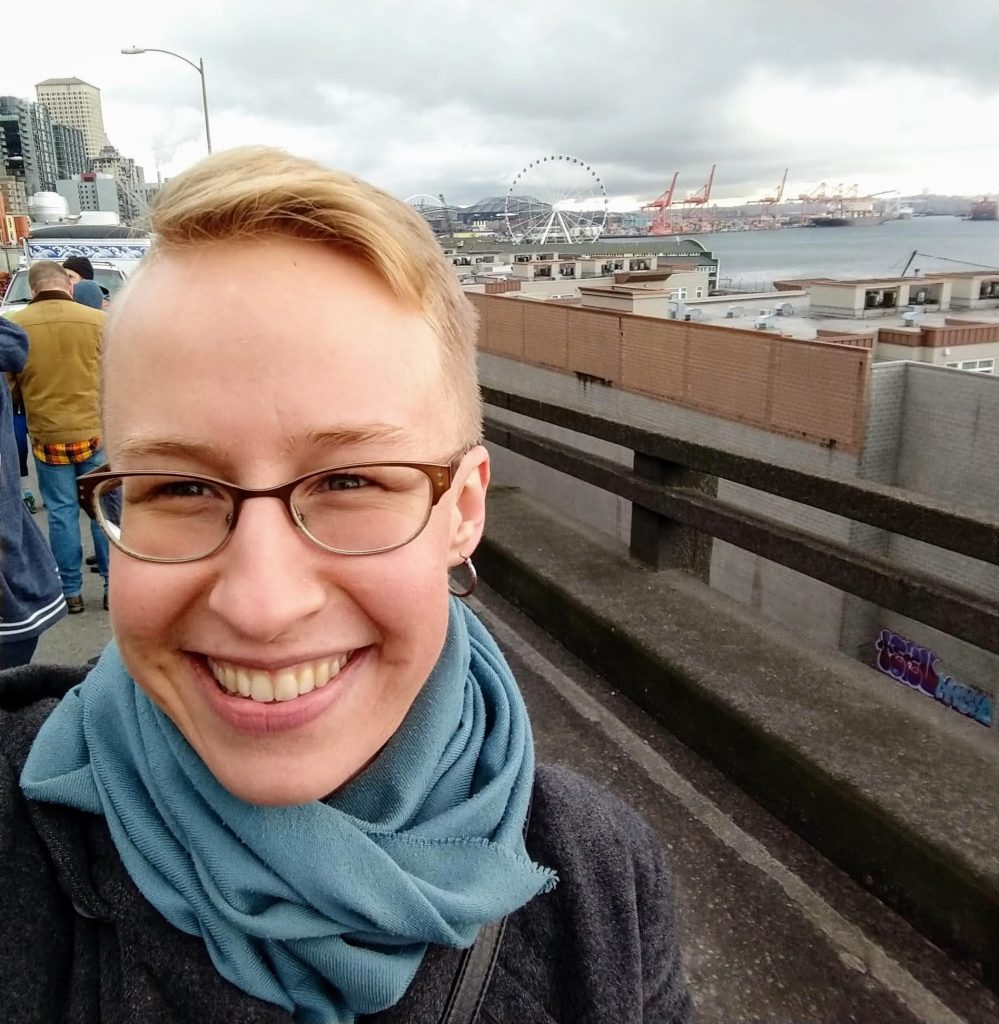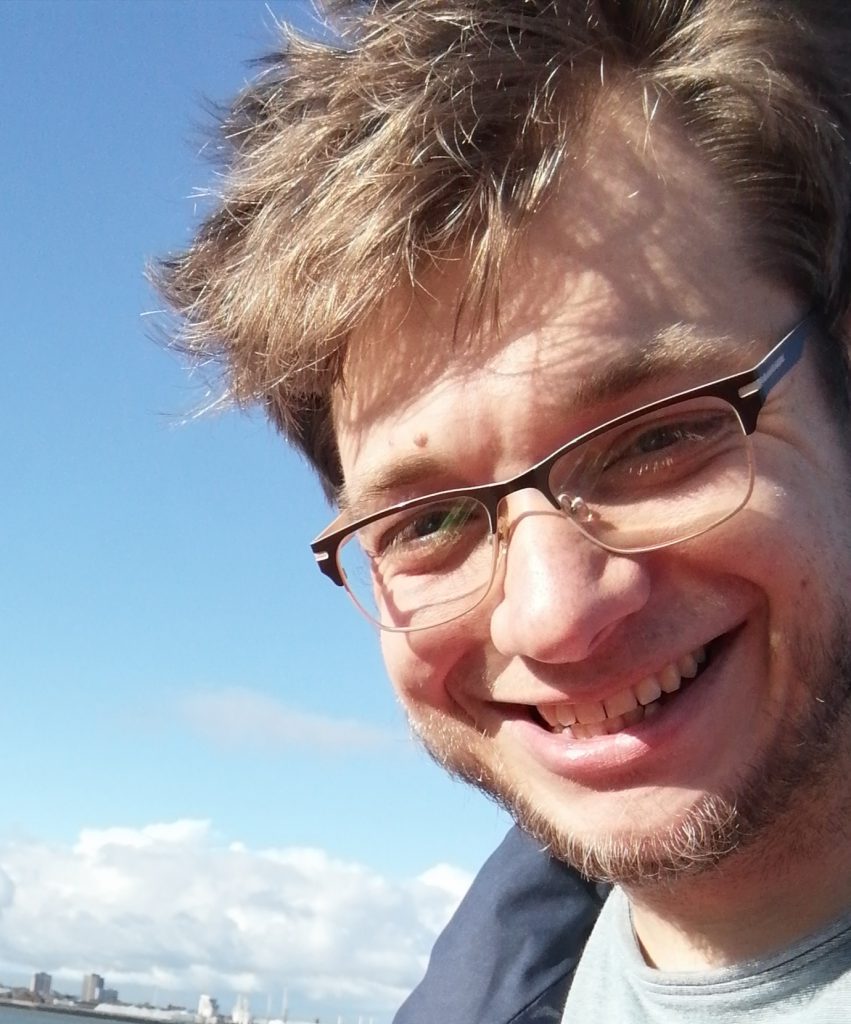edited by Chelle Parker
Captain Ruby Tauda of the whale-ship Balentora strapped down a crate of medicine and hurried across the star-whale’s mouth. She and her crew had always used the mouth as a cargo bay, but this wasn’t their usual cargo. They weren’t thieves.
“Secure?” Ruby asked her copilot, Loto, pausing with her hand over the comms button sewn delicately to the wall.
“Secure, Captain,” Loto confirmed as he pulled one last strap tight.
Ruby slammed her hand down on the comms button to give the command. “Cargo secure. Go.”
“Going,” Johnnie Quo, Balentora’s navigator, said. “Looks like we have enough cover.”
The plan had been to blend in with other departing ships and hope no one on Port Helleta noticed the missing star-whale medicine before they got away. They weren’t thieves, but then they’d learned that Balentora’s grandchildren and their age-mates were sick with a degenerative muscle disease. Port Helleta’s authorities had medicine that could help, but they couldn’t agree whether to use it. If the star-whales’ illness killed them, that meant more dead star-whales for humans to fly—far more. And while they debated, the whales were running out of time.
Balentora had been dead for decades. Ruby, in her youth, had found it drifting in a star-whale graveyard and politely sung its ghost the traditional shanty to ask, “Would you fly for me?” The ghost had been lucid enough then to say yes.
“Wait,” Johnnie said, their voice taut. Ruby’s already nervous stomach did a dive. “There’s an enforcer ship behind us.”
“Following us?” If they were caught, they’d be imprisoned. Worse, the sick star-whales would die before anyone decided what to do with the medicine.
A full star-whale life could last three hundred years. Ruby had been taught never to fly a whale-ship with an unwilling ghost, and only to ask star-whales who had died of old age for their service. But not all humans followed those principles, and star-whales were desirable ships—they could sing to the universe, open thresholds through space without the aid of a gate. That was more than enough reason for Port Helleta’s authorities to consider refusing to help.
“Yes. Yes, it’s following us. Shit.”
“Then we need to run.”
Loto was already galloping up the whale’s throat. Ruby didn’t have to tell him to get his violin ready; they’d been crewing Balentora together for years.
The whale’s ghost had grown less lucid in that time. It got confused easily. After the first few times it had failed to understand more complex songs, Ruby had stopped singing them. She knew there might only be a few more years where Balentora could fly, and it hurt to see it struggle.
Worrying about whether Balentora was up for complicated maneuvering, Ruby hurried through the sloping hallways from the whale-ship’s mouth to its left eye, their command center. The inside of the whale-ship was soft like the flesh of an almost-ripe peach, celadon in color and odorless. Its skin had calcified until it was impermeable to space debris.
The eye socket cradled Johnnie’s blinking screens, comms equipment, charts, and the detritus of their lives on board the star-whale. Ruby shoved an empty coffee mug aside and grabbed her concertina, sliding her thumbs through the straps. She leaned over Johnnie’s chair and looked through Balentora’s eye. Their getaway route was littered with the other ships orbiting, leaving, and arriving at Port Helleta station. Beyond was the sparkling darkness of space, and the octagonal orange shimmer of Helleta gate. If they could just reach it ahead of the enforcers, they could get through to Crocosmia space, where Helleta’s authorities would be forced to do bureaucratic battle to retrieve the stolen cargo.
Loto hurtled in, out of breath, holding his violin case. He knelt on the floor to snap open the case and extract the instrument.
Johnnie’s fingers flew over their navigation panel, calculating the positions of the other ships, their trajectories and speed, finding a route through. Ruby stood and planted her feet, and Loto’s arms bent into graceful curves, readying his violin and bow. Johnnie set the metronome ticking, and Ruby’s breath hitched. That was faster than they’d asked Balentora to fly in a very long time.
A clear, familiar A♭ rolled off Johnnie’s tongue as they sang the crew into the music. That was a turn to starboard, and Ruby knew the five bars of music that followed like she knew her own turning feet. Johnnie held up six fingers for six repetitions, the degree of turn, and the words to the song poured out of their mouth as the concertina breathed between Ruby’s hands and the strings of Loto’s violin vibrated through the eye socket.
“Oh, the land is below us, the seas are behind,” Johnnie sang,
“and the sky is no longer a ceiling.
Hey, ho, breathe in the stars, love,
your mouth fills with joy and with dreaming.
Cast off from the station, swim fast now,
we all know there’s love in the leaving.”
Ruby loved that voice, the song, the instrument in her hands, the whale. She’d learned this art at her mother’s knee. It felt like hers, part of her body, inextricable. She almost felt as if she and the whale’s ghost were still young. She remembered what it was like to know the whale would respond to every breath of music.
Johnnie changed the song, asking the whale to dive. The metronome ticked frenetically. Ruby wasn’t sure she’d made Balentora’s ghost understand what was happening to its grandchildren. It didn’t recognize the cargo in its mouth. She could tell it didn’t understand why they were asking it for such speed. Through the eye, Ruby saw a long-haul passenger ship almost straight ahead. But Balentora responded to the familiar dive song, and they passed under the other ship, alarmingly close to its belly.
The ghost strained and heaved the whale’s body through space. Ruby’s hands felt slippery with sweat; she was terrified she’d hit a wrong note. Loto’s bow arm was a blur.
Johnnie navigated them around a tiny shuttle, cueing Ruby and Loto’s music with hand gestures and their voice. They weren’t far from the gate now, but Ruby could see the blinking indicator of the enforcer ship on scan, and it was gaining on them.
They slipped past a buoy, and the orange of the gate was vivid and staticky with energy ahead of them. Nearly there, Ruby thought, concertina alive with sound between her hands.
Suddenly another ship surged into view, blocking their path. Loto made a noise like he’d been kicked in the belly.
Johnnie stopped singing, looked frantically between their console and the eye of the whale. “That’s another enforcer,” they muttered. “Where the hell did that come from?”
Two more enforcer ships appeared, flanking the one straight ahead. There was no way to reach the gate now. Johnnie held up a fist to stop the music and the eye of the whale fell abruptly silent. They slowed to drifting.
Johnnie’s comms panel pinged loudly in the silence, and they punched the button to allow the transmission through. “Port Helleta Enforcement to Balentora. We have received a report that your crew is responsible for theft. You are not authorized to leave Helleta space. Prepare to be boarded. You have five minutes to acknowledge.”
No. It rang through Ruby’s mind, through her whole body. They couldn’t get caught. They had to get the medicine to Balentora’s grandchildren.
“We could hide the cargo,” Loto said. “Try to deny it.”
Ruby shook her head. “We don’t know how much evidence they have.”
“What else are we going to do?” Johnnie asked. “Balentora could have got us out ten years ago, probably, but now…”
It had been years since they’d sung the song asking the whale to open a threshold. They were all afraid to find it wouldn’t answer. Opening thresholds took power the whale’s ghost didn’t have anymore.
“We don’t know that for sure,” Ruby said. “We don’t know it can’t do it.”
Johnnie and Loto stared at her. “You know how slow it is to respond,” Johnnie said, too gently.
“We have no other options.” Desperate and stubborn, and captain of the ship: It was Ruby’s call.
She sang the first line of the shanty to ask a star-whale to be a ship. It felt like a way to remind Balentora, to cue the aging mind of the whale’s ghost. Then she changed the song.
Ruby remembered the threshold song, of course. She remembered all the songs, even if Balentora didn’t.
“Ask the black to bloom, my love,” Ruby sang. Loto still looked doubtful, but he joined her anyway, pulling the music from his violin. Johnnie added their voice. Ruby felt the whale’s ghost turn its attention to them, curious, confused.
The ghost considered, its unstable mind sifting through the request. Ruby closed her eyes.
Balentora broke into answering song. Its music filled the whale-ship, resounding through its fins and tail. It sang as it hadn’t sung in years. It remembered, maybe, what they were running for. It remembered the joy of opening a threshold.
A threshold opened. It glinted with the no-color shine of between-space, hiding the enforcer ships and the gate behind it. Music filled the whale’s mouth and its crystallized eyeballs. There was only a moment where they were outside the threshold looking in, and then they were swimming through the waves of between-space for a time-tilted whole note. Ruby forgot how to breathe. Then the threshold spit them back into normal space.
Ruby felt tears wetting her eyelashes. For so long, she’d been gentling the whale along, not asking its ghost to do anything challenging. That had not kept at bay her sadness over its fading understanding. And, she realized now, it would not lighten her memory of Balentora’s last few years of flight. What she would remember were moments like this one: doing something big, something that mattered enormously. Trusting Balentora’s ghost enough to try, and seeing what it could do.
“We’re in Crocosmia space,” Johnnie said, checking the scan. “But nowhere near the other side of Helleta gate. They’ll have no way of finding us.”
The ghost’s song trailed off, but Ruby felt it smile and turn unerringly towards star-whale home-space. Balentora’s grandchildren would live.
© 2024 by Devin Miller
1710 words
Author’s Note: This story was inspired by several prompts I mashed together, one of which was “invent an alien aquarium,” and another of which was this David Bowie quote: “On the other hand, what I like my music to do to me is awaken the ghosts inside of me. Not the demons, you understand, but the ghosts.” And from there I got to piloting a whale ship by singing space shanties to its ghost. Since real whales sing, using music to communicate was the obvious choice. I’m not a musician, however, and after the first draft, when I thought, “I guess I can’t totally handwave how this works, how unfortunate,” I made my much-more-musical-than-me girlfriend help me figure out how it should work. Whales were also an obvious choice, because I’m kind of a nerd about whales. I am full of whale facts, which I mostly did not use in the story, but here’s a cool musical one: In 1979, National Geographic included a whale song record with the magazine, which at the time had a circulation of 10.5 million. This is still the largest single print order of any recording ever made.

Devin Miller is a queer, genderqueer cyborg and lifelong denizen of Seattle, with a love of muddy beaches to show for it. Their short fiction has appeared in Beneath Ceaseless Skies, PodCastle, and Strange Horizons; their poetry received an honorable mention in the 2022 Rhysling Awards and once appeared on a King County Metro bus terminal. You can find Devin under a tree, probably, or at devzmiller.com.
If you enjoyed the story you might also want to visit our Support Page, or read the other story offerings.




 The Prey of Gods is a science fiction and fantasy novel from Harper Voyager, the premier novel by Nicky Drayden.
The Prey of Gods is a science fiction and fantasy novel from Harper Voyager, the premier novel by Nicky Drayden.